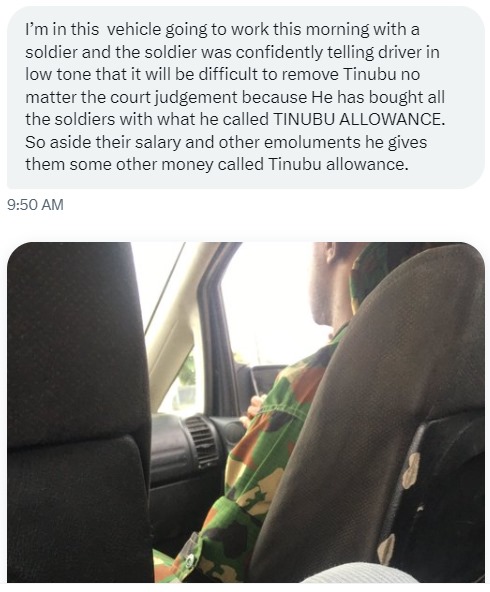
David Hundeyin, a popular investigative journalist has thrown another bombshell on X platform formally Twitter. In his post, he revealed why it will be difficult to remove President Bola Tinubu.
For those celebrating what was apparently their "victory" yesterday, I have very little to say.
— David Hundeyin (@DavidHundeyin) October 27, 2023
Apparently your "Asiwaju" is paying the military rank-and-file a special extra-budgetary allowance so that they don't carry out a coup – such is his level of confidence in his own… pic.twitter.com/nmcuT6ZgDl
See David Hundeyin posts 👇:
For those celebrating what was apparently their “victory” yesterday, I have very little to say.
Apparently your “Asiwaju” is paying the military rank-and-file a special extra-budgetary allowance so that they don’t carry out a coup – such is his level of confidence in his own “mandate.”
However long this marriage of strange bedfellows lasts, it will inevitably come to and end. When it does, I will be here to tweet “I told you so” as I always do.
Tomorrow’s Max Siollun history books are being written in real time today. Good luck to all of us.

This explosive revelation by David Hundeyin has sent shockwaves throughout the nation. The idea that President Tinubu has been paying off the military rank-and-file to secure his position is not only concerning but raises questions about the state of democracy in Nigeria.
Hundeyin’s claim hints at a precarious situation where Tinubu’s hold on power might be tenuous. While his tactics may have worked so far, relying on payments to maintain support within the military is not a sustainable long-term strategy. It exposes a vulnerability in his regime and highlights the need for broader support beyond financial incentives.
The mention of Max Siollun, a renowned historian known for documenting Nigeria’s military coups and transitions, adds another layer of significance to Hundeyin’s statement. It suggests that the current political landscape is on the brink of being immortalized in the annals of history.
The reactions to Hundeyin’s post are varied. Some view it as a confirmation of their suspicions about Tinubu’s tactics, while others dismiss it as mere speculation. Nonetheless, it has ignited discussions and raised concerns about the integrity of Nigeria’s democratic process.
As citizens, we must critically examine the implications of Hundeyin’s claims. If true, it speaks to a democracy that is far from stable, where influence can be bought and legitimacy remains questionable. It reminds us of the importance of vigilance and the need to hold those in power accountable.
Only time will reveal the veracity of these allegations and the future of President Tinubu’s reign. But for now, David Hundeyin’s bombshell has added a new layer of complexity to the Nigerian political landscape, leaving us all to ponder the true cost of power and the lengths some leaders may go to retain it.










